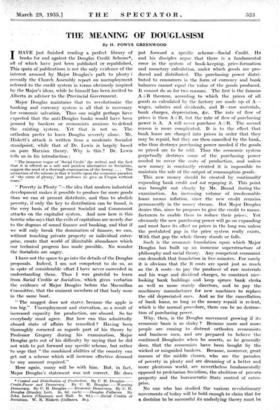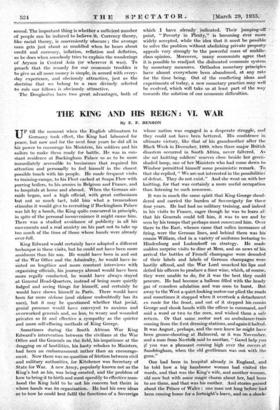THE MEANING OF DOUGLASISM
By H. POWYS GREENWOOD
I HAVE just finished reading a perfect library of books for and against the Douglas Credit Scheme*, all of which have just been published or republished. This spate of publications is not the only evidence of the interest aroused by Major Douglas's path to plenty recently the Church Assembly report on unemployment referred to the credit system in terms obviously inspired by the Major's ideas, while he himself has been invited to Alberta as adviser to the Provincial Government.
Major Douglas maintains that to revolutionize the banking and currency system is all that is necessary for economic salvation.' Thus one might perhaps have expected that the anti-Douglas books would have been penned by bankers or economists _anxious to defend the existing system. Yet that is not so. The orthodox prefer to leave Douglas severely alone. Mr. Hiskett's attack is written from a moderate Socialist standpoint, while that of Dr. Lewis is largely based on pure Mandan theory. Why is this ? Dr. Lewis tells us in his introduction :
The immense vogue of 'Social Credit' (he writes) and the fact that it is offered as a safe and painless alternative to Socialism, suggest the need of a thorough examination of the heresy. . . . The attraction of the scheme is that it builds upon the economic paradox of the curse of plenty,' but professes to give us Utopia without tears."
" Poverty in Plenty "—the idea that modern industrial development makes it possible to produce far more goods than we can at present distribute, and thus to abolish poverty, if only the key to distribution can be found, is the very basis of the present Socialist and Communist attacks on the capitalist system. And now here is this heretic who says that the evils of capitalism are merely due to the dogmas of sound finance and banking, and that if we will only break the domination of finance, we can, without touching private property or individual enter- prise, create that world of illimitable abundance which our technical progress has made possible. No wonder the Socialists are angry. - I have not the space to go into the details of the Douglas proposals. Indeed, I am not competent to do so, as in spite of considerable effort I have never succeeded in understanding them. Thus I was grateful to learn from Social Credits or Socialism, which gives verbatim the evidence of Major- Douglas before the Macmillan Committee, that the eminent members of that body were in the same boat.
" The maggot does not starve. because the apple is too big." Unemployment and starvation, as a result of increased capacity for production, are absurd. So far everybody must agree. But how can this admittedly absurd state of affairs be remedied ? Having been thoroughly cornered as regards part of his theory by Professor Gregory during his examination, Major Douglas gets out of his difficulty by saying that he did not wish to put forward any specific scheme, but rather to urge that " the combined abilities of the country can get out a scheme which will increase-effective demand to any amount required."
Here again, many will be with him.- But, in fact, Major Douglas's statement was not correct. He does * Control and Distribution of Production. By C. H. Douglas- Credit-Power and Democracy. By C. H. Douglas— Warning Democracy. By C: H. Douglas—Economic Democracy: By C. H. • Douglas (Stanley, Lott. 3s. 6d. each)—Douglas Fallacies. By John Lewis (Chapman and Hall. 3s. 6d.)-e---Social -Credits or Boaialistn. W. R. Hiskett (Gollance. 6s.). put forward a specific scheme—Social Credit. He and his disciples argue that there is a fundamental error in the system of book-keeping, price-formation and monetary calculation, under which goods are pro- duced and distributed. The purchasing power distri- buted to consumers in the form of currency and bank balances cannot equal the value of the goods produced. It cannot do so for two reasons. The first is the famous A+B theorem, according to which the prices of all goods as calculated by the factory are made up of A— wages, salaries and dividends, and B—raw materials, bank charges, depreciation, &e. The rate of flow of prices is then A-+B, but the- rate of flow of purchasing power is A. A will never purchase A+B. The second reason is more complicated. It is to the effect that bank loans are charged into prices in order that they may be repaid, but they are then cancelled by the bank, who thus destroys purchasing power needed if the goods so priced are to be sold. Thus the economic system perpetually destroys some of the purchasing power needed to cover the costs of production, and unless new money is constantly created it is impossible to maintain the sale of the output of consumption goods.
This new money should be created by continually expanding bank credit and not repaying it. This point was brought out clearly by Mr. Brand during the examination. An increasing volume of irredeemable loani means inflation, since the new credit remains permanently in the money stream; But Major Douglas denies this, since he proposes to give the credit to manu- facturers to enable them to reduce their prices. Yet obviously the new purchasing power will go on expanding and must have its effect on prices in the long run unless the postulated gap in the price system really exists. With that gap the whole theory stands or falls.
Such is the economic foundation upon which Major Douglas has built up an immense superstructure of philosophy and social theory. Any competent economist can demolish that foundation in five minutes. For surely it is obvious that the B costs are spent just as much as the A costs—to pay the producer of raw materials and his wage and dividend charges, to construct nice- looking bank buildings and keep spruce bank clerks as well as more stately directors,' and to pay the machinery manufacturer for new machines to replace the old depreciated ones. And as for the cancellation of bank loans, so long as the money repaid is re-lent, which is the normal procedure, there can be no destruc- tion of purchasing power.
Why, then, is the Douglas movement growing if its economic basis is so shaky ? Because more and more people are coming to distrust orthodox economists and business men, and are prepared to believe the confirmed Douglasite when he asserts, as he generally does, that the economists have been bought by the wicked or misguided bankers. Because, moreover, great masses of the middle classes, who see the paradox of poverty in plenty and are dreaming of a better and more plenteous world, are nevertheless fundamentally opposed to proletarian Socialism, the abolition of private property and the bureaucratic State control of enter- prise.
No one who has studied the various revolutionary movements of today will be bold enough to claim that for a doctrine to be successful its underlying theory must be sound. The important thing is_whether a sufficient.number of people can be induced to believe it Currency theory, like racial theory, is conveniently obscure ; the average man gets just about as muddled when he hears about credit and currency, inflation, reflation and deflation, as he does when somebody tries to explain the wanderings of Aryans in Central Asia (or wherever it was). To preach that the remedy for our economic troubles is to give us all more money is simple, in accord with every- day experience, and obviously attractive, just as the doctrine that we belong to a race divinely selected to rule our fellows is obviously attractive.
The Douglasites have two great advantages, both of which _I ha,ve. already indicated. Their jumping-off point, " Poverty in Plenty," is becoming ever more widely accepted, while the idea that it must be possible to solve the problem without abolishing private property appeals very strongly to the powerful mass of middle- class opinion. Moreover, many economists agree that it is possible to readjust the dislocated economic system by monetary measures. Orthodox monetary principles have almost everywhere been _abandoned, at any rate for the time being. Out of the conflicting ideas and experiments of today, a new monetary practice may well be evolved, which will take us at least part of the way towards the solution of our economic difficulties.







































 Previous page
Previous page